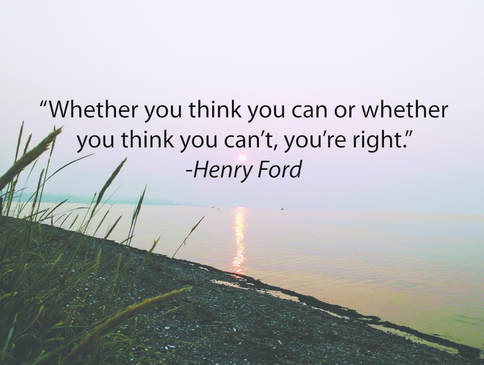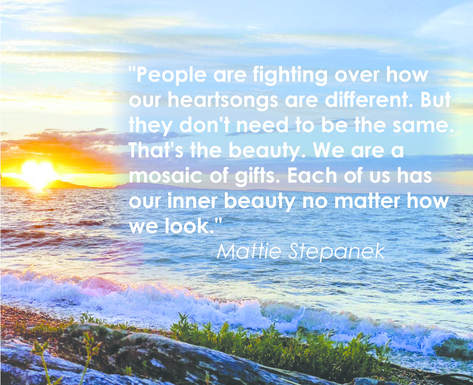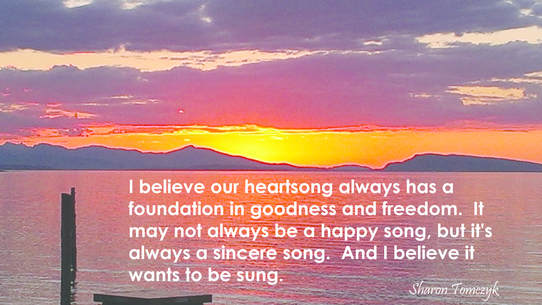|
Read below, or listen to an audio recording of the blog. If I were to ask you to sing right now, in front of me, how would it make you feel? I'm sure some of you would smile and eagerly share a song. However, for those who feel they "can't sing" or who have been told they shouldn't, the very thought of singing in front of someone can cause their heart rate to rise, muscles to tense, and spark a thought something like, "Oh crap! She wants me to do what?" When people think about singing their body reacts in a habitual and emotional way that is influenced by their personal relationship to singing, their opinion of their singing voice, and very commonly, from negative messages they received from others over their lives in response to their singing. Every week I hear new stories about how, usually in childhood, a person was given negative feedback about their singing voice by school choir teachers, parents, family and/or friends. This results in a negative personal association and a lack of trust in their own singing voice. These negative associations can stay with people for years, even throughout a lifetime, causing a detrimental physiological and psychological response to singing. My experience has shown that most people don't even realize they're having this response, but it's this very response that's contributing to the less-than-pleasing sound they may hear when they are singing. Fortunately, once the reaction is recognized it can be re-patterned, eventually resulting in a free and joyful singing voice. I often ask newer students how they feel when asked to sing in public or around peers, and commonly they share with me that they feel anxious, (or down-right scared) tense, vulnerable, start comparing themselves to others, and they often think negative things about their voice or ability to sing. The trouble is, this tension and un-supportive self-dialogue makes it much more difficult for the singer to control their voice and sing in a way that pleases them. Instead, the singers breathing gets shallower, their muscles get tight, and their focus shifts away from the song or music and towards worried thought about how good (or bad) they will sound, and what others will think of their singing. If people have practiced this negative association to their own singing voice enough, over time the thought of singing will instantly create a stress response in their body instead of a relaxed state of enjoyment. The tension will inevitably have a detrimental effect on the sound the singer makes when they do sing, which reinforces the negative self-talk ... and the cycle continues. What you think, your body will respond to. The action of singing, being (in part) a physical activity, requires the intricate coordination of muscles, nerves, and breath. The brain being the control center, sends the signals required to sing, to the rest of the body based partly on impulse and partly on the conscious or unconscious thoughts we are having at the time. I see it often. A student will think, "I can't sing that note. It's too high." and inevitably they prove themselves right. If you think you have a terrible voice, or that no one would want to hear you sing, your body is going to respond accordingly, making it almost impossible to sing freely. If, out of the gate, a person tells themselves they will not sing something well, what is the likelihood they will? How do we change these patterns when we have been practicing them for so long? As long as the cycle of (sometimes unconscious) negative self-talk is present, it's going to be difficult for the singer to get the best sound from their voice. It is possible though. The first step to breaking this cycle is self-awareness based in curiosity. If you are asked to sing in front of others, what physical and emotional sensations arise in you? Do you experience shakiness, difficulty controlling breath, negative self-talk, racing heart rate, a feeling of vulnerable, tense muscles, feeling tongue tied, brain going blank (can't remember the song or lyrics) or any other feeling that relates to a negative association with your singing voice? All of these sensations have been trained into you because of the external (other people) and internal (self-talk) experiences you have had around your singing. If you notice any of them in yourself, just note them. They're a perfectly natural response that almost everyone has felt while singing, at one time or another. When you bring your awareness to these feelings when they arise, they lose some power. The next part requires practice because it involves re-wiring your automatic response to singing, and that takes time and intention. The process itself can be quite simple however. Spend some time thinking about how you want to feel when you sing. Confident, joyful, relaxed, connected, happy, expressive, playful, free, open, sincere...? A student of mine who is timid about her singing voice at times, expressed that she would like her voice to feel like springtime. When I asked her to describe that to me a bit further, she said that springtime felt full of opportunities for growth and possibility. Now that's a nice place to sing from. Find a feeling that's comfortable to you. (In the context of singing) Can you bring yourself to a state of feeling it right now? Give it a try. The next time you sing notice how you are feeling; and be aware if there is any kind of stress or negative response in your mind or body when you do so. If there is, remind yourself of the state you wish to feel when you are singing. The one you just practiced. Call upon this positive association and see if you can replace the negative feeling with the positive one. "I want to feel relaxed and happy when I am singing". Take a deep breath, and give yourself a moment to set a new feeling intention for your singing experience, and do your best to hold on to this while you are singing. As simple as this may seem, this process is actually building new neural pathways in your brain, that will eventually lead to more positive association with your singing voice. Over time your body will react differently when you start singing because your brain will associate the act with a positive state instead of a stressful one - and your voice will adjust accordingly. Your voice may be louder, clearer, and more controlled due to slower breathing, better focus, and more relaxed muscles. More importantly, your experience of singing will be much more enjoyable , and that really is the whole point isn't it.
1 Comment
For those who do not know, Mattie Sepanek was a poet, peace activist, and visionary, who passed away in his 13th year from complications due to Dysautonomic Mitochondrial Myopathy. Mattie's short journey was unlike most of ours, as he spent much of his life in a wheelchair, hooked up to a ventilator, oxygen, and the monitors that kept him alive. In spite of this, Mattie had a drive for life that inspired many, and an insight into the best of humanity, which he shared in compilations of poetry he called Heartsongs. While Mattie's influence lives on, through The Mattie J.T. Stepanek Foundation which was started to spread his messages of peace and humanitarianism, for me, Mattie primarily serves as an example of someone who was not afraid to show up and share his truest self with anyone who would listen. Mattie intuitively knew that each of us has a song in our heart; something to express that is unique to each one of us, and that the world would be a better place if we allowed ourselves to connect to this song and share it freely. He chose to express his heartsongs publicly, with five published books, and appearances on Oprah, but the benefit of us showing up and sharing our heartsong can be equally valuable in a private moment with a loved one, or a conversation with a friend. We have all felt the power of sincere and heartfelt exchange at different moments in our lives, and recognize its importance at some level, but all too often I talk to people who feel disconnected from the song of their heart. Fortunately, using music and singing, people can safely explore their heartsong, reconnect with it, and express themselves in an entirely new way. It's interesting that Mattie chose to use the words Heart and Song to describe his work. heart immediately evokes feelings of love, emotion, sincerity, or passion, and the word song, in this context, feels like free and natural expression. Like Maddie, I believe we all have a heartsong which can express itself in a wide variety of ways: through music or singing, art, inventions and ideas, or dedication to a cause. Regardless of its form, I believe our heartsong always has a foundation in goodness and freedom. It may not always be a happy song, but it's always a sincere song. And I believe it wants to be sung. Often students come to my studio with a strong need to connect more deeply with themselves and others, but experience a block when it comes to expressing themselves. It's not hard to figure out the reasons for this. We learn, starting as young children, that it's safer to keep our opinions to ourselves, to tow the line, to not rock the boat, to keep a stiff upper lip, or to be seen and not heard. Should we risk vulnerable self-expression we face being shut down, ridiculed, or even reprimanded. People who have their voice hushed throughout their lives, especially in childhood, wonder why they have such a difficult time connecting with their own voice, or feel so disconnected from the song in their hearts. When a student or program participant finds the connection, often with that first freely expressed note, it's as if a flood gate opens, and it can be a profoundly life-changing experience. For some people, it's the first time in a very long time, they have truly let their voice be heard. This is one of the reasons I continued to be awed by the power of change, singing can bring to a life, and why I love the work I do so much. The following series of questions, and a short video exercise, was designed to give you the opportunity to explore the expression of your own heartsong. Please keep in mind that the questions are not related to your skill (or perceived skill) as a singer, but intended to be an exploration of some of the core principles of heart-centered singing. If you have an experience related to these exercises, or the expression of your own heartsong that you would like to share, I invite you to contribute in the comment section below. (I have chosen to moderate the comments posted to the blog, to make sure the forum remains a safe and positive experience for everyone. I will be notified as soon as you post a comment, and once approved, the comment will visible below this blog posting.) -Do you believe you have a Heartsong? If you do, how easy is it for you to hear it, or express it? -Alone, if you were to sing a note or simple melody from a heart-centered place, how do you think the sound would differ from a note sung with nervousness, uncertainty, or shyness? (I think of the latter examples as brain-centered singing) -If you were to sing the feeling of sincerity, what would it sound like? Video - The Silent Song. I would suggest you do this exercise alone, so you don't feel self-conscious. Self-consciousness and self-judgement are the fasted way to disconnect you from this exercise. Pause this video at any time if you would like to continue any part of the exercise for longer than demonstrated on the video. For more information on Mattie, and all the great work that is being done through The Mattie J.T Stepanek Foundation, please visit the website here. http://www.mattieonline.com/ Thank you Mattie, for sharing your Heartsong with us all. |
AuthorSharon Tomczyk is professional singer and vocal instructor, published author, and program coordinator/educator living on Vancouver Island, Canada. ArchivesCategories |




 RSS Feed
RSS Feed